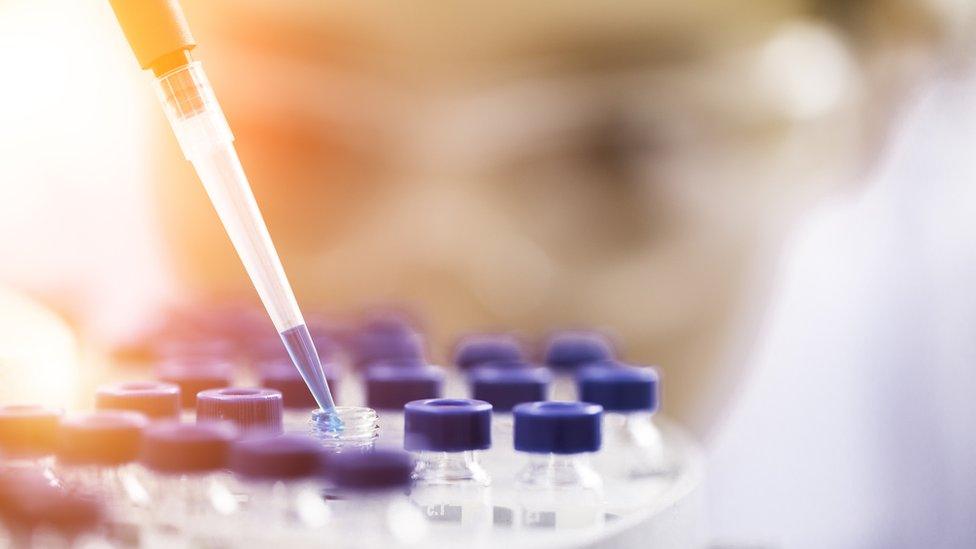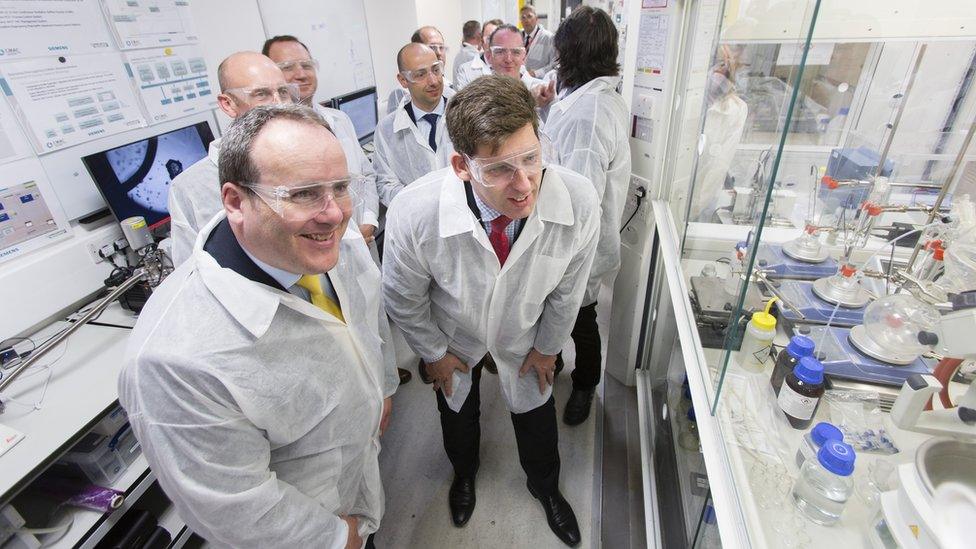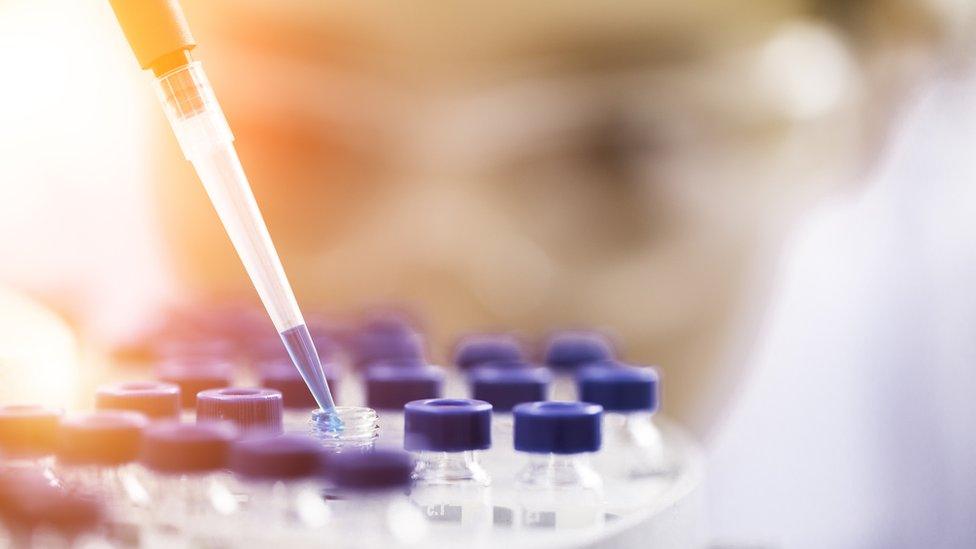'World-first' medicine centre to be located in Scotland
- Published

A multi-million-pound drug manufacturing "innovation centre" is to be located in Renfrewshire.
The £56m plant near Glasgow Airport is expected to support 80 highly-skilled jobs within five years.
The first centre of its kind in the world, it is also predicted to attract £80m of research and development investment by 2028.
The work to be carried out is expected to speed up the rate at which new drugs come on to the market.
With funding from both the public and private sector, including £15m from Scottish Enterprise, the project has been developed with input from key industry figures.
'Great news' for life sciences
Business minister Paul Wheelhouse said it was likely to be hugely beneficial to the Scottish economy.
And he said the location of the Medicines Manufacturing Innovation Centre (MMIC) was a "positive endorsement" of Scotland's life and chemical science sectors.
Conservative peer and Parliamentary Under Secretary of State for Scotland Office, Lord Duncan, said the centre was "great news" for the UK's life sciences sector.
With funding from both the public and private sector, including £15m from Scottish Enterprise, the project has been developed with input from key industry figures.
Mike Thompson, of the Association of the British Pharmaceutical Industry, said the MMIC was a "strong signal of intent" from government and industry.
"Medicines manufacturing is no longer the siloed, labour-intensive process of yesteryear," he added.
"This cutting-edge centre instead provides a unique space for academics, research scientists and manufacturing partners to work side by side designing new ways to transition the medicines of the future out of development and into the supply chain.
"Global pharmaceutical companies are already excited about UK science, our world-leading universities and unique research centres and this facility means we now have a manufacturing innovation site to rival anything in the world."

Paul Wheelhouse [left] and Lord Duncan were united in their backing for the project
It will be located next to the National Manufacturing Institute for Scotland in the advanced manufacturing innovation district at Inchinnan.
Iain Nicolson, the leader of Renfrewshire Council, said the move would benefit all of Scotland.
"On top of the highly-skilled jobs the centre will bring, its work will generate more jobs by encouraging start-ups and supporting companies large and small to grow their businesses using the transformative technologies the centre develops," he added.
But the decision has sparked anger within North Ayrshire Council, which had hoped to attract the centre to a life sciences park in Irvine.
Council leader Joe Cullinane said the decision was "extremely frustrating".
He said £10m had been invested in site infrastructure at the park to make it ready for new investment like the MMIC.
Skilled workforce
"With the support of large multi-national businesses, already located there, this would have allowed the MMIC to get up and running immediately," he added.
"We have a strong, dynamic, skilled workforce already in place, with the infrastructure to complement that."
He said he was angry that strong socio-economic reasons for choosing North Ayrshire had been overlooked.
There is one job for every two people of working age in the area and a third of children are living in poverty, he added.
And he demanded a "full disclosure" of the assessment that led to the decision to select the site in Renfrewshire.
"The majority of project finance is coming from the public sector so we have to ask why the UK and Scottish governments have not been bold, strong and taken the decision themselves to base the MMIC in not only the best location but also the area that stands to benefit from it most."
In response, Mr Wheelhouse said the selection was made by an independent consultancy which took into account the views of the commercial funding partners.
He added: "Inchinnan was chosen because of its strong manufacturing vision and excellent connectivity, including proximity to an international airport and access to future manufacturing talent through nearby universities and colleges and co-location with the National Manufacturing Institute for Scotland.
"We fully intend this investment will drive sector growth wherever medicines manufacturing occurs in Scotland."
Lord Duncan also highlighted the importance of the sector, saying: "We need more new medicines to tackle deadly diseases more quickly and through our modern industrial strategy we want to see more of this world leading research and manufacture done here in the UK.
"The UK government has provided significant backing to this project, with UK Research and Innovation investing £13m through the Industrial Strategy Challenge Fund."

Analysis by Douglas Fraser, BBC Scotland business/economy editor

Inchinnan used to be known for its India tyre factory, still to be seen in its art deco offices. That opened in 1927, after the site had been used for building airships.
At the west end of Glasgow Airport's runway, with both advanced manufacturing and pharma development, plus companies including Rolls-Royce, it is an important hub for the most modern part and best hope of Scotland's economy.
So there may be no surprise that it's the choice for the £56m medicines laboratory, half funded by the taxpayer. Businesses tend to cluster. Technicians can be more readily recruited if they know there is a range of employers in the area.
However, the complaint from North Ayrshire on behalf of Irvine is a telling one. The New Town has a decent track record in pharma. It has more need and hunger for the quality jobs such a centre might bring.
Joe Cullinane, the Labour council leader, adds to his grievance the loss of a bid for Scotland's new social security agency, coming with the devolution of powers. That's going to bring 850 jobs to Dundee and Glasgow.
He has an interesting point. There is a difficult choice to be made between:
Putting economic regeneration into cities, in the expectation of benefits travelling out from the centre as a result of workers travelling in
And on the other hand, ensuring any new jobs, with government backing, are in areas of most economic aid.
And these are often the towns around the cities, which have lost industries. They're losing people and footfall for businesses, or they're becoming dormitories. Ayrshire seems to specialise in them. For all of Inchinnan's gains, Renfrewshire is also troubled that way.
For the Scottish and UK governments, this is a challenge at the heart of regional and industrial policy - how much to use taxpayer funding to close the yawning inequality gaps between different areas of these countries.